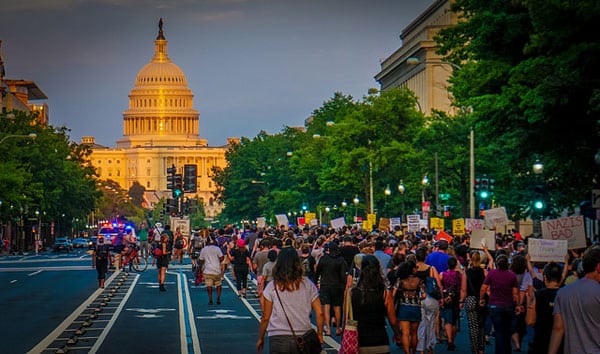
July 21, 2018; New York Times
A little less than a year ago, images from Charlottesville were seared into the national imagination as white nationalists marched in the streets and one white nationalist rammed his car into counter-protestors, killing 32-year-old paralegal Heather Heyer and injuring nineteen others.
Charlottesville, a liberal university town of 47,000 that is used to getting accolades like “America’s happiest city,” rallied to support those who opposed the Unite the Right protests. Residents, writes Farah Stockman in the New York Times, attended concerts to raise money for victims and the City Council “voted to shroud [Confederate] figures in black tarps.” The city also renamed part of Fourth Street “Heather Heyer Way.”
There were also political changes. As Stockman explains, “Since the rally, nearly every official who held power at the time has resigned or retired. The city attorney, who concluded that there was no legal way to stop the rally, took a job in another town. The police chief stepped down in the wake of a critical report accusing him of failing to protect the public on the day of the rally. The city manager, who oversaw the city’s response, will leave by the end of this year.”
In last November’s city elections, Nikuyah Walker, a Black female activist, won more votes than any other candidate for city council. Her colleagues subsequently voted 4–1 to elect her mayor in January, making Walker the city’s first Black female mayor.
Walker, notes Stockman, is “unlike anyone who had been elected to the Council in decades.… A parks and recreation aide who earns $14.40 an hour, she shamed the city into paying its temporary and seasonal workers a living wage. A former resident of a low-income housing development known as Friendship Court, she went door to door, organizing residents to give them a greater voice in the plan to transform the development into mixed-income housing.”
“But…change has been slow to take hold,” writes Stockman. As Dave Norris, who served as Charlottesville’s mayor from 2008 to 2012, notes “what she’s up against is a community that’s rather fond of itself and rather enamored with the status quo.”
Meanwhile, last February a local judge ordered the City Council to “take down the black shrouds covering two Confederate monuments while a lawsuit continues” over the city’s plan to permanently remove them.
Sign up for our free newsletters
Subscribe to NPQ's newsletters to have our top stories delivered directly to your inbox.
By signing up, you agree to our privacy policy and terms of use, and to receive messages from NPQ and our partners.
For some, the response has been to blame “outsiders” rather than address racial inequality. For instance, Debbie Weisser, manager of the Court Square Tavern, remarks that, “It’s people from out of town bringing that negativity to Charlottesville.” Weisser includes those seeking to remove Confederate statues as “negative” influences.
Some more openly oppose the mayor. For instance, Jon Bright, president of the North Downtown Neighborhood Association, contends that, “We’re sitting here with all these people who are screaming and focused on turmoil, and our mayor was one of them.”
Dr. Andrea Douglas, director of the nonprofit Jefferson School African American Heritage Center, points out that while some label the “alt-right” protestors as outsiders, Unite the Right rally organizer Jason Kessler lives in town and is a University of Virginia graduate. “This notion of ‘outsiderness’ is interesting,” Douglas remarks.
Walker’s run for City Council, launched months before the white nationalist rally, had the slogan “Unmasking the Illusion.” Her run as an independent, notes Stockman, was “a signal that she intended to challenge the establishment Democrats.” Despite Charlottesville’s tony image, 18 percent of families in the city earn less than $35,000 a year, according to a 2015 study.
In office, Walker has advocated building “thousands of new apartments.” (The report to the city in April noted that there was an eight-year housing voucher waitlist). Walker has also called for an end to “stop-and-frisk” policing, sought to “give a new Civilian Review Board powers to oversee police conduct,” and pushed the University of Virginia to support low-income residents.
Walker faces resistance within city government too. Walker, notes Stockman, chided city housing officials for not responding to her inquiry about a 76-year-old woman evicted from public housing; she has also expressed concerns about the city manager hiring process.
At a forum held last month on racial and economic disparities, Walker remarked that, “For decades, people wanted to hide behind the illusion of perfection in Charlottesville…. It’s hard growing up in Charlottesville and being Black in Charlottesville. There are so many people who are brilliant and talented and they never make it because of the conditions of this city.”—Steve Dubb












